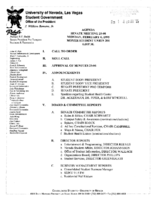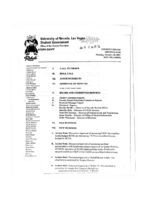Search the Special Collections and Archives Portal
Search Results

Transcript of interview with Floyd Jenne by Ping Lee, March 10, 1981
Date
Archival Collection
Description
On March 10, 1981, Floyd Jenne (born June 6th, 1915 in Ogden, Utah) was interviewed by Ping Lee at the University of Nevada, Las Vegas. The interview covers Mr. Lee’s life as a police officer in Boulder City, Nevada. Mr. Lee also recalls going to school in McGill, Nevada and Ely, Nevada and working in Boulder City and Las Vegas, Nevada.
Text

Joseph Kine interview, March 02, 1976: transcript
Date
Archival Collection
Description
On March 2, 1976, collector Debbie Nesbit interviewed Joseph Kine (born November 16th, 1906 in Elkhart, Iowa) in his home in Boulder City, Nevada. In this interview, Mr. Kine discusses working at Hoover Dam (Boulder Dam) as a high scaler. He also speaks about living in Boulder City in its very beginnings as a town.
Text

Virginia T. Lanier interview, March 16, 1981: transcript
Date
Archival Collection
Description
From the Ralph Roske Oral History Project on Early Las Vegas collection OH-01060. On March 16, 1981, collector Heidi G. Hughes speaks to Virginia T. Lanier at the collector’s home in Las Vegas, Nevada. Lanier talks about living on the Strip in Las Vegas, Nevada in the 1950’s and 1960’s. She speaks about her experiences riding the bus, working in food service, and what the Strip was like during the time period.
Text

Transcript of interview with Laura & Don Garvin by Michael Martocci, March 3, 1979
Date
Archival Collection
Description
On March 3, 1979, Michael Martocci interviewed Laura (born in California) and Don Garvin (born in Goldfield, Nevada) about their lives in Las Vegas, Nevada. The two provide details on their family background, the first sources of water in Las Vegas, and the early city limits. They also describe their early occupations, religion, gambling, the Mormon Fort, and the effects of the Great Depression. The interview concludes with a brief discussion on the development of the Las Vegas Strip and recreational activities.
Text

Meeting minutes for Consolidated Student Senate University of Nevada, Las Vegas, January 30, 1995
Date
Archival Collection
Description
Text

Meeting minutes for Consolidated Student Senate University of Nevada, Las Vegas, November 12, 1987
Date
Archival Collection
Description
Text

Meeting minutes for Consolidated Student Senate, University of Nevada, Las Vegas, February 28, 2000
Date
Archival Collection
Description
Text

Meeting minutes for Consolidated Student Senate, University of Nevada, Las Vegas, January 22, 2001
Date
Archival Collection
Description
Text

Long Range Planning Study for Temple Beth Sholom, July 1988
Date
Archival Collection
Description
This report provides the results of a study conducted by CITYWEST, Inc., to "determine whether the synagogue should remain in its current location and be renovated, remain in its current location and rebuild, or move." The report addresses leadership and staff development, as well as programming recommendations.
Text

Jewish Federation of Las Vegas long-range planning study, 2000
Date
Archival Collection
Description
Long-range planning study conducted and prepared by the Levenberg Consulting Group regarding the Jewish community of Las Vegas with particular attention to Jewish elderly, the economically disadvantaged, young adults, and Jewish education at all ages.
Text
